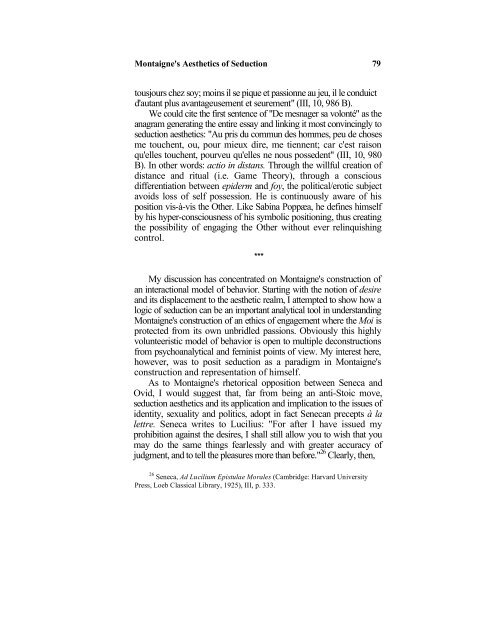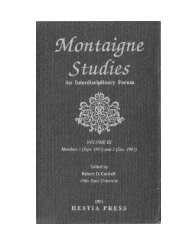Free PDF Download - Montaigne Studies - University of Chicago
Free PDF Download - Montaigne Studies - University of Chicago
Free PDF Download - Montaigne Studies - University of Chicago
Create successful ePaper yourself
Turn your PDF publications into a flip-book with our unique Google optimized e-Paper software.
<strong>Montaigne</strong>'s Aesthetics <strong>of</strong> Seduction 79<br />
tousjours chez soy; moins il se pique et passionne au jeu, il le conduict<br />
d'autant plus avantageusement et seurement" (III, 10, 986 B).<br />
We could cite the first sentence <strong>of</strong> "De mesnager sa volonté" as the<br />
anagram generating the entire essay and linking it most convincingly to<br />
seduction aesthetics: "Au pris du commun des hommes, peu de choses<br />
me touchent, ou, pour mieux dire, me tiennent; car c'est raison<br />
qu'elles touchent, pourveu qu'elles ne nous possedent" (III, 10, 980<br />
B). In other words: actio in distans. Through the willful creation <strong>of</strong><br />
distance and ritual (i.e. Game Theory), through a conscious<br />
differentiation between epiderm and foy, the political/erotic subject<br />
avoids loss <strong>of</strong> self possession. He is continuously aware <strong>of</strong> his<br />
position vis-à-vis the Other. Like Sabina Poppæa, he defines himself<br />
by his hyper-consciousness <strong>of</strong> his symbolic positioning, thus creating<br />
the possibility <strong>of</strong> engaging the Other without ever relinquishing<br />
control.<br />
***<br />
My discussion has concentrated on <strong>Montaigne</strong>'s construction <strong>of</strong><br />
an interactional model <strong>of</strong> behavior. Starting with the notion <strong>of</strong> desire<br />
and its displacement to the aesthetic realm, I attempted to show how a<br />
logic <strong>of</strong> seduction can be an important analytical tool in understanding<br />
<strong>Montaigne</strong>'s construction <strong>of</strong> an ethics <strong>of</strong> engagement where the Moi is<br />
protected from its own unbridled passions. Obviously this highly<br />
volunteeristic model <strong>of</strong> behavior is open to multiple deconstructions<br />
from psychoanalytical and feminist points <strong>of</strong> view. My interest here,<br />
however, was to posit seduction as a paradigm in <strong>Montaigne</strong>'s<br />
construction and representation <strong>of</strong> himself.<br />
As to <strong>Montaigne</strong>'s rhetorical opposition between Seneca and<br />
Ovid, I would suggest that, far from being an anti-Stoic move,<br />
seduction aesthetics and its application and implication to the issues <strong>of</strong><br />
identity, sexuality and politics, adopt in fact Senecan precepts à la<br />
lettre. Seneca writes to Lucilius: "For after I have issued my<br />
prohibition against the desires, I shall still allow you to wish that you<br />
may do the same things fearlessly and with greater accuracy <strong>of</strong><br />
judgment, and to tell the pleasures more than before." 26 Clearly, then,<br />
26 Seneca, Ad Lucilium Epistulae Morales (Cambridge: Harvard <strong>University</strong><br />
Press, Loeb Classical Library, 1925), III, p. 333.




